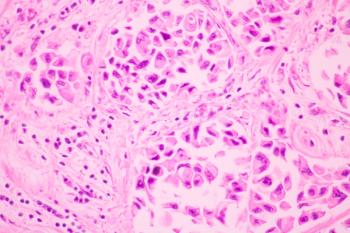
NATALEE: Ribociclib and Endocrine Therapy in HR+/HER2- Early Breast Cancer
Aimee Keegan, PharmD, BCOP, discusses key unmet needs that the NATALEE trial addresses for patients with HR+/HER2- early breast cancer.
Episodes in this series

This is a synopsis of a Peer Exchange series featuring Aimee Keegan, PharmD, BCOP, of City of Hope.
In this video, Aimee Keegan, PharmD, BCOP, discusses the NATALEE trial, a phase 3 study that evaluated the use of adjuvant ribociclib in early breast cancer. The trial included patients at high risk of recurrence, including those with no nodal involvement, and assessed invasive disease-free survival at 3 years. The study found a significant difference in the ribociclib plus aromatase inhibitor (AI) arm compared to the hormonal therapy alone arm. Specifically, ribociclib led to a 30% risk reduction for stage 2 patients and a 24.5% risk reduction for stage 3 patients. However, overall survival data is still immature, and the results have not yet led to the approval or addition of ribociclib to the NCCN guidelines.
Dr. Keegan compares the NATALEE trial to the monarchE trial, which led to the approval of abemaciclib in the adjuvant setting and is currently included in the guidelines. The main difference between the two trials is that NATALEE allowed earlier stage patients, including those who were node-negative (T2N0), as long as they had a high risk of recurrence. In contrast, monarchE only included node-positive patients. This difference expands the patient population eligible for CDK4/6 inhibitors in the adjuvant setting to include high-risk, node-negative patients who would otherwise not qualify.
The potential approval of ribociclib based on the NATALEE trial results could provide patients with more options, particularly those who cannot tolerate abemaciclib. Dr. Keegan gives an example of a patient experiencing significant diarrhea with abemaciclib who would prefer to stop treatment. In such cases, having ribociclib approved would allow healthcare providers to switch to another agent and offer different options. This approval would expand patient access to CDK4/6 inhibitors in the adjuvant setting.
Dr. Keegan emphasizes that the NATALEE trial results could significantly impact the treatment landscape for early breast cancer patients at high risk of recurrence, providing them with additional treatment options and potentially improving outcomes. However, she also notes that further data, particularly on overall survival, is needed before ribociclib can be officially approved and added to clinical guidelines for use in the adjuvant setting.
*Video synopsis is AI-generated and reviewed by Pharmacy Times editorial staff.
Newsletter
Stay informed on drug updates, treatment guidelines, and pharmacy practice trends—subscribe to Pharmacy Times for weekly clinical insights.




























